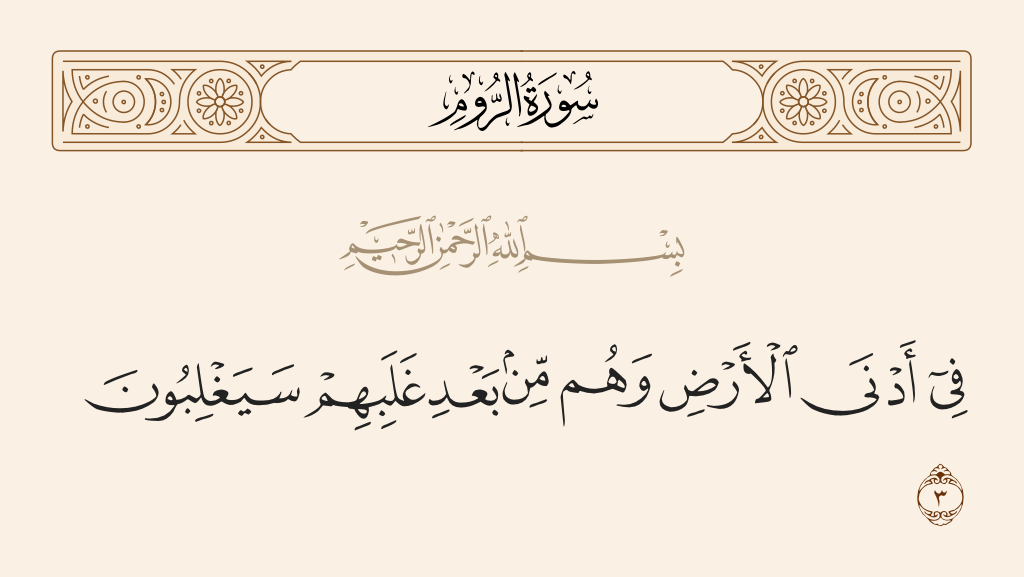Surat Ar-Rum Verse No. 3: Reading and listening
Translation of the verse 3 from Surah Ar-Rum : Number of verses 60 - - page 404 - Part 21.

﴾فِيٓ أَدۡنَى ٱلۡأَرۡضِ وَهُم مِّنۢ بَعۡدِ غَلَبِهِمۡ سَيَغۡلِبُونَ ﴿
[ الروم: 3]
In the nearer land (Syria, Iraq, Jordan, and Palestine), and they, after their defeat, will be victorious.
English - Sahih International
In the nearest land. But they, after their defeat, will overcome.
Tafheem-ul-Quran by Syed Abu-al-A'la Maududi
(30:3) in the neighbouring land; *1 but after their defeat they shall gain victory in a few years.
Tafheem-ul-Quran by Syed Abu-al-A'la Maududi
*1) from what lbn `Abbas and the other Companions and their followers have said, it appears that the Muslims' sympathies in this war between Byzantium and Iran were with Byzantium and of the disbelievers of Makkah with Iran. This had several reasons. First, the Iranians had given it the colour of a crusade between Magianism and Christianity, and, apart from the object of political conquest, they were making it a means of spreading Magianism. In the letter that Khusrau Parvez wrote to the Emperor Heraclius after the conquest of Jerusalem, he had clearly mentioned his victory as a proof of the truth of Magianism. In principle, the Magian creed resembled the polytheistic creed of the people of Makkah, because the Magis too, were disbelievers of Tauhid they believed in two gods and worshipped the fire. That is why the mushriks of Makkah were in sympathy with them. Contrary to them, the Christians, however corrupted their monotheism might be, still regarded belief in One God as the basis of religion, believed in the Hereafter and admitted Revelation and Prophethood as the source of guidance. Thus, their religion in principle resembled Islam, and therefore, the Muslims were naturally in sympathy with them, and could not like that a polytheistic people should dominate them. Secondly, the people who believe in a previous Prophet before the advent of a new Prophet are naturally regarded and counted as Muslims until the message of the new Prophet reaches them and they clearly discard it. (Please see E.N. 73 of Surah AI-Qasas also). At that time only five to six years had passed since the Holy Prophet's advent as a Prophet and his message had not yet reached outside Arabia. Therefore, the Muslims did not look upon the Christians as disbelievers, but they certainly regarded the Jews as disbelievers because they had rejected the Prophet Jesus (may peace be upon him) to be a Prophet. Thirdly, the Christians from the very beginning had been treating the Muslims with sympathy as already mentioned above in Al-Qasas: 52-55, and in AI-Ma'idah: 82-85, and many of them were even accepting the message of the Truth with an open heart. Then, the way the Christian king of Habash had given refuge to the Muslims on their migration there and turned down the demand of the disbelievers of Makkah to return them, also required that the Muslims should wish the Christians well as against the Magians.
Source : Ar-Rum Verse 3: In the nearest land. But they, after their defeat, will overcome.